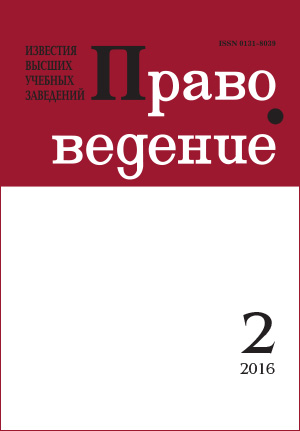Государство как правовая конструкция
Аннотация
В статье рассматривается теоретическая категория государства в контексте постклассической парадигмы. Согласно мнению автора, важнейшая особенность постклассического подхода в социально-гуманитарном познании — переориентация всех явлений действительности на человека как организующий центр, вокруг которого выстраивается реальность, организуемая, таким образом, с точки зрения воспринимающего и познающего субъекта. Указанное обстоятельство позволяет рассматривать явления внешнего (как природного, так и социального) мира в качестве результатов конструирующей деятельности человеческого сознания. Таким образом, объекты внешнего мира представляют собой феномены, сформированные в процессе интенционального восприятия их субъектом. Подобный подход стал применяться не только в гуманитарных науках, но и в математике, где уже в начале прошлого века получил распространение конструктивистский подход, нашедший свою реализацию и в физике в рамках квантовой механики. Конструктивистская парадигма стала развиваться также в лингвистике и других гуманитарных науках. Данная статья представляет собой попытку применить основные методы постклассического познания к теории государства. Концепция автора предполагает, что государство — конструкция, создаваемая членами общества в процессе социальных взаимодействий. Для исследования феномена государства используется семиотический подход, в соответствии с которым государство есть знаковая модель, включающая в себя три аспекта: семантический, синтактический и прагматический, причем в работе раскрываются все три указанных аспекта. Руководствуясь выдвинутой идеей, автор рассматривает феномен государства не только в синхронном (статическом), но и в диахронном (динамическом) измерении, выделяя основные стадии эволюции государства и исследуя закономерности, определяющие его эволюционное развитие.
Ключевые слова:
постклассическая парадигма, социальный конструктивизм, конструктивистская математика, картезианская лингвистика, семиотика, семантика, синтактика, прагматика, государство, традиционное государство, протосовременное государство, современное государство, постсовременное государство
Скачивания
Библиографические ссылки
Загрузки
Опубликован
Как цитировать
Выпуск
Раздел
Лицензия
Статьи журнала «Правоведение» находятся в открытом доступе и распространяются в соответствии с условиями Лицензионного Договора с Санкт-Петербургским государственным университетом, который бесплатно предоставляет авторам неограниченное распространение и самостоятельное архивирование.




